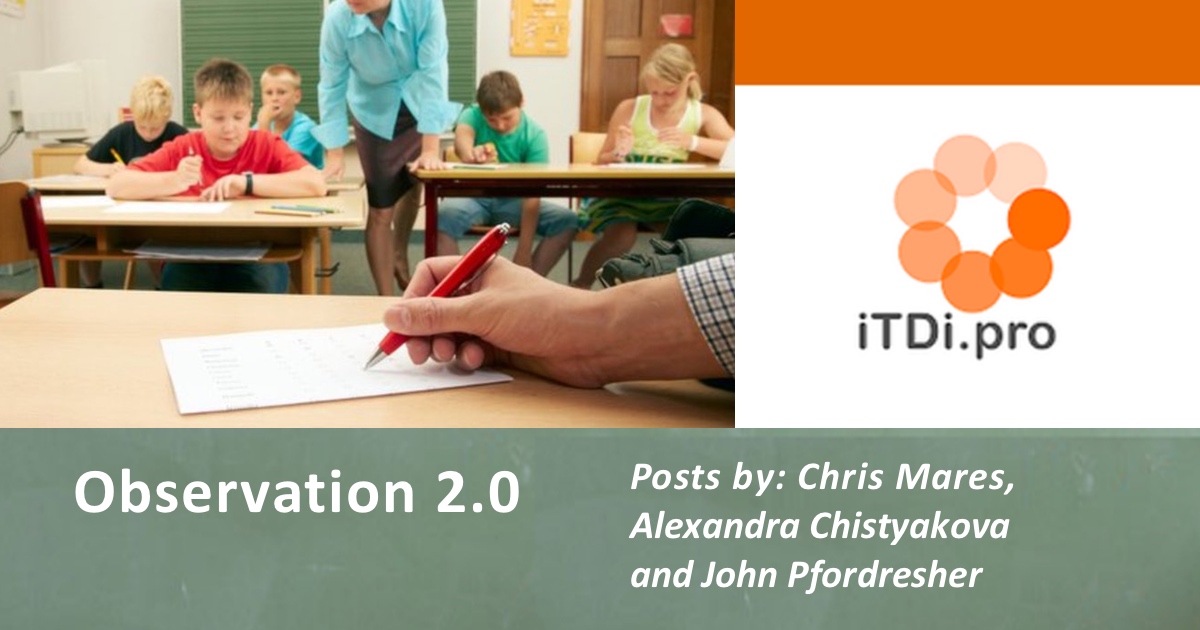
The thought of “being observed” has struck fear into the hearts of many a teacher, including myself. It is often associated with being assessed for some purpose or other, whether it be for a qualification or a performance review. Naturally, when this happens, teachers are more likely to find themselves focused more on the act of being observed than the act of teaching. This is unfortunate and counter-productive. I know, I’ve been there. Initially then, and like many of my peers, I didn’t like being observed and I was unable to teach in a way that was natural for me, at least in my very early years.
I am now in a different place and my experiences as a teacher, mentor, trainer, peer teacher, mentee, and on-going learner have lead me to believe that there are many benefits to be gleaned from observing and being observed. More than that, I believe in an open door policy by which interested peers, trainees, or those simply interested in teaching and learning can pop in. Under certain conditions, of course.
Why observe?
Teaching is both an art and a skill and as such teachers need to see the act of teaching being carried out in order to fully learn how to do it. When we observe others teach, we not only get ideas for classroom activities and learn new techniques, we also develop a sense of what we do ourselves and where our strengths and weaknesses lie. Thus, in one sense, we observe in order to learn and to hone our craft. However, we can also observe peers in order to offer support and feedback. This, when done constructively, not only provides useful information for the observed teacher, it also helps strengthen professional ties and creates an atmosphere of trust and support.
I believe teachers should be observed primarily to get constructive feedback on what they do in the classroom. However, this is not the only reason. Sometimes fellow teachers who are taking over a class or substituting for a class will benefit from observing a class they will teach in the future. This is also something that students notice and appreciate.
Who should you observe?
The greater the variety of teachers you observe, the more you learn. If you only observe teachers you like or who are similar to you in some way, then your learning will be limited. If you observe teachers who you know to be different from you, then you may see things done differently and in a way you didn’t previously consider but might find useful. If you are easy-going in the classroom, then it would be interesting to observe someone with firm classroom management skills. We learn not only from what we see but also from reflecting on how we teach ourselves as a reaction to observing others. Try to observe both new teachers and seasoned veterans.
By the same token, the more you are observed by different types of teachers or personality types, the more varied and potentially useful feedback you will get.
What to observe
There are many ways to observe, from the holistic and impressionistic to the very specific. You can observe simply to get a sense of a particular class or to see how a teacher deals with error correction, or classroom management. That said, it is crucial to remember that there is a lot that you cannot observe, for example, what happened in the previous class, or what will happen subsequently. A lot of the art of teaching is not observable as a snapshot, but occurs over time, such as the feeling of trust that can develop between a teacher and student.
How to observe
There are different ways to observe and it is worth experimenting with them. One way is to simply sit and watch the class without taking notes. Another way is to use a rubric that focuses on a particular aspect of teaching such as “teacher action”, “student action”, i.e. what the teacher does and says and what the students do. If a rubric is too complex, however, it becomes difficult to both observe and to make notes.
The bottom line
For me, being observed is more a norm than an exception. It is something I am used to and something my students are used to. I feel a classroom should be a welcoming place and one in which anyone should feel comfortable. The people who observe my classes include potential students, potential teachers, fellow teachers, peer committee members, and interested community members. I have welcomed them all but I do insist on meeting them to discuss their intentions and to offer some explanation of what I do in class and why. This is important. Teaching is an ongoing and complex business, involving the establishing of protocols and relationships. This takes time. A one off observation cannot possibly capture this and a single snapshot can be misleading. This is something that both teachers and those observing need to understand.
An end note
I will repeat the fact that I didn’t initially like being observed because, as a novice teacher, I felt vulnerable and insecure. I wasn’t sure of what I was doing and I didn’t relish the idea of being judged or criticized. At the same time, I had no experience of observing so I was unaware of the tremendous benefits of observation.
I am sure the feelings I had are common and not ones to be ashamed of. However, I now value the act of observing and being observed. I have learnt a great deal from observing others and have also benefited from the feedback I have received from being observed.
Many years ago, when I did my Cambridge Diploma in TEFLA at International House in London, I remember being observed by the excellent Ruth Gairns. The first time she observed me she had a yellow legal pad on her lap. I glanced down at it before I was about to begin my class and saw that she had written, “Good Points.”
I’ve never forgotten that, for good reason.


